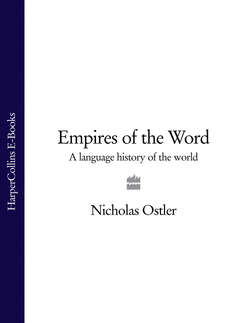Читать книгу Empires of the Word: A Language History of the World - Nicholas Ostler - Страница 38
Northern influences
ОглавлениеThen the Tungus-speaking Jurchen people, now to be known as the Manchus, gained a second chance to dominate China. This invasion was the last permanent penetration of China by speakers of a foreign language.
In the early seventeenth century, the Manchus had been reorganised, under two able leaders, and advanced into the northern marches of Chinese territory to establish a capital at Mukden. Then, in 1644, they had the luck to be invited
into Beijing as a tactical move in a struggle between two generals contending to replace the Ming. The Manchus took the opportunity to install themselves, styling their new dynasty with the name Qīng (, ‘Pure’), and by 1651 had put down all resistance in the rest of China. Although they came speaking their own language, and it remained an official written language of the Chinese state until the end of the dynasty in 1911, it had died out in speech even at court by the eighteenth century. The language did not survive even in Manchuria itself, a curious victim of its people’s successful takeover of China and its way of life. Today it is only spoken, under the name of Xibo, by the descendants of a detachment of troops dispatched from the Manchurian capital Mukden to Xinjiang in 1764—a north-eastern language now spoken only in the Chinese north-west.
It was into the north that the invaders came, and the Chinese spoken in the north went on to become the standard language for the country. But although the northern dialect underwent significant changes, they can only partly be put down to the particular difficulties that Xiongnu, Tabgach, Jurchen, Mongol or Manchu would have encountered as they tried to get by in Chinese.* There is the interesting fact that Mandarin Chinese can distinguish wŏmen, ‘we (excluding you)’, from zănmen, ‘we (including you)’, just as Mongol and Manchu do; this is an innovation since Middle Chinese. And perhaps one can point to the absence of consonant clusters in modern Chinese, some of which were allowed in Middle Chinese. For example, sniwər, ‘appease’, and t’nwâr, ‘secure’, have become sūi and tŭo. Altaic languages cannot abide more than one consonant at the beginning of a syllable.†
There are in fact a few written relics of the kind of Chinese that was spoken in one of the intermediate periods before the invaders were absorbed. The thirteenth-century Chinese translation of The Secret History of the Mongols is full of Altaic patterns such as postpositions instead of prepositions, verbs following the object, and existential verbs at the end of the sentence, all weird in Chinese, whose basic word order is much more like English:
There is no reason why a daughter, born to you, should always stay at home.
And there is copious evidence for mixtures of Manchu and Mandarin in the zĭ-dì-shū, ‘Son’s Books’, which are a written record of the narrative entertainment the Manchu enjoyed in their early days in Beijing (1736–96), though they are written more with Chinese word order scattered with Manchu vocabulary.
In northern dialects there is still a tendency for direct objects to occur rather often before the verb, and for than-phrases to occur before comparative adjectives, features that might be attributed to Altaic influence. But in general this mixed style of Chinese did not establish itself.17 Later generations of invader families picked up Chinese naturally from their Chinese mothers, nurses and schoolmasters; probably the Altaic patterns were just too far opposed to Chinese for any compromise to develop. This is typical enough of Chinese linguistic relations: in general, there are not many loan words in Chinese borrowed from other languages in any direction, and certainly no structural influences; dú, ‘calf’, does seem to have come from Altaic, characteristically enough since its peoples lived by stockbreeding (cf. Mongol tuγul, Manchu tukšan, Evenki tukučən, all meaning ‘calf’), but the many Mongol words that are found in the drama of the Yuan dynasty have since been lost again.18
